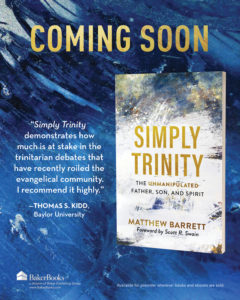
An Invitation to the Heidelberg Catechism: Part Three
Q &A 2 continues the theme of comfort with an outline split into three big parts:
&A 2 continues the theme of comfort with an outline split into three big parts:
Q: How many things must you know to live and die in the joy of this comfort?
A: Three: first, how great my sin and misery are; second, how I am delivered from all my sins and misery; third, how I am to thank God for such deliverance.
- Misery (Q&A 3–11/Lord’s Days 2–4)
- Deliverance (Q&A 12–85/Lord’s Days 5–31)
- Gratitude (Q&A 86–129/Lord’s Days 32–52)
The question is translated very smoothly. A rougher translation would be, “How many things must you know that you, enjoying this comfort, may live and die happily?” Some say Q&A 1 is “the mountain peak” while Q&A 2 is “the valley.” But Q&A 2 speaks of enjoying (fruens) comfort and living and dying happily!
Confidence in Life and Death
Obviously, we know it’s a joyful and happy thing to live in the confidence of belonging to Jesus. But did you notice both Q&A 1–2 also say it’s a happy thing to die in the confidence of belonging to Jesus? From prison Paul wrote, “it is my eager expectation and hope that I will not be at all ashamed, but that with full courage now as always Christ will be honored in my body, whether by life or by death” (Phil. 1:20). Then we read that famous line, “For to me to live is Christ, and to die is gain” (Phil. 1:21). That’s the joy of the Christian life! Evangelicals hardly know what Jesus even saves them from. Click To Tweet
When the Catechism speaks of how many things must you know, it’s not merely an impersonal knowledge it’s after, but “seeing and feeling the greatness of [my] sins and misery in [myself] with pain and concern, and having an earnest desire to be delivered from [my] sins and misery.”
The Depth of Misery
I must know how great my sin and misery are. Do you know that “those who are well have no need of a physician, but those who are sick…For I came not to call the righteous, but sinners” (Matt. 9:12, 13). Do you know how great your sins against God are and therefore how miserable you’d be apart from his grace?
Note Paul’s oxymoronic statement in Ephesians 2:1–2: “And you were dead in the trespasses and sins in which you once walked.” We were like zombies—dead yet alive; alive physically, but inside empty and “dead.” Therefore, we lived our lives “following the course of this world, following the prince of the power of the air, the spirit that is now at work in the sons of disobedience” (Eph. 2:2). He writes as a Jew “among whom we all once lived in the passions of our flesh, carrying out the desires of the body and the mind, and were by nature children of wrath, like the rest of mankind” (Eph. 2:3). Did you hear that? We all “were by nature children of wrath.” Not only were we “dead” by actually committing “transgressions and sins” but we were also dead by originally committing transgression and sin in our father Adam (Rom. 5:12).
We were born similar to poisonous snakes – with venom even though we don’t use it until developed. Compare this to a recent survey. “Everyone sins a little, but most people are good by nature.” 52% of evangelicals somewhat or strongly agree! “Even the smallest sin deserves eternal damnation.” Only 54% of evangelicals somewhat or strongly agree! “An individual must contribute his or her own effort for personal salvation.” A staggering 74% of evangelicals somewhat or strongly agree! Evangelicals hardly know what Jesus even saves them from.
The Deliverance from Sin
We were in burial linens, he clothed us with pure white robes. Click To Tweet I must know how I am delivered (liberer) from all my sins and misery. How am I delivered from original and actual sins? “But God!” (v. 4) These are the two simplest yet greatest words the world has ever heard! These two small words magnify the free grace of God toward us as sinners by contrasting what we deserved as “objects of wrath” with what God has given us, his grace.
Even when we were dead in our trespasses of God’s holy Law, “but God!” Even when we were dead in our sins, “but God!” Even when we walked according to the course of this world, “but God!” Even when we walked after the ways of the Devil, “but God!” Even when we fulfilled the desires of the flesh and mind, “but God!”
Even when we were by nature children of wrath, “but God!” And “being rich in mercy” and “because of the great love with which he loved us even when we were dead in our trespasses” (v. 4) God “made us alive together with Christ—by grace you have been saved” (v. 5). We were dead; he made us alive! We were hollow zombies; he made us Spirit-filled images of God. We were six feet under the ground, he took us into his heavenly banquet room. We were in burial linens, he clothed us with pure white robes. Note the progression: made alive, then “raised…up,” and finally “seated…in the heavenly places” (v. 6).
The Life of Gratitude
I must know how I am to thank God for such deliverance. This is what Paul said, when he asked, “Are we to continue in sin that grace may abound?” (Rom. 6:1) What was his answer? “Do not present your members to sin as instruments for unrighteousness, but present yourselves to God as those who have been brought from death to life, and your members to God as instruments for righteousness” (Rom. 6:13). Take up the Heidelberg Catechism and embrace your “comfort” of serving the Savior who gave himself for your sins. Click To Tweet
Look at Ephesians 2:10: “For we are his workmanship, created in Christ Jesus for good works, which God prepared beforehand, that we should walk in them.” That word “created” is used elsewhere to speak of the entire created realm (Rom. 1:20) but here Paul has our personal new creation in view. “Therefore, if anyone is in Christ, he is a new creation; the old has gone, the new has come!” (2 Cor. 5:17)
Now you can “walk” in “good works” in contrast to walking in trespasses and sins, according to the world’s ways, in the devil’s footsteps as before. Just as we were predestined before the foundation of the world to salvation as chapter 1 says, so too the good works that we are to do have been predestined by God. Doesn’t that just blow your mind away? This is the life you are now able to live in the Spirit as God’s resurrected people.
Take up the Heidelberg Catechism and embrace your “comfort” of serving the Savior who gave himself for your sins.
**This is part three of Daniel’s three-part post on the Heidelberg Catechism. To read part one, click here. To read part two, click here.**

